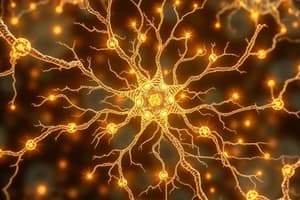Podcast
Questions and Answers
Which neurotransmitter is primarily associated with inhibitory effects in the brain?
Which neurotransmitter is primarily associated with inhibitory effects in the brain?
- GABA (correct)
- Serotonin
- Dopamine
- Glutamate
What is the primary role of acetylcholine in the nervous system?
What is the primary role of acetylcholine in the nervous system?
- Modulating pain responses
- Facilitating muscle activation and memory (correct)
- Affecting attentional processes
- Regulating mood and appetite
Which neurotransmitter is NOT classified as a small molecule neurotransmitter?
Which neurotransmitter is NOT classified as a small molecule neurotransmitter?
- Endorphins (correct)
- Norepinephrine
- Serotonin
- Dopamine
What mechanism do neurotransmitters use to terminate their action in the synaptic cleft?
What mechanism do neurotransmitters use to terminate their action in the synaptic cleft?
Which disorder is most directly associated with an imbalance of serotonin?
Which disorder is most directly associated with an imbalance of serotonin?
In which way do gaseous neurotransmitters like nitric oxide primarily influence the nervous system?
In which way do gaseous neurotransmitters like nitric oxide primarily influence the nervous system?
Which neurotransmitter is primarily connected with reward and motivation mechanisms?
Which neurotransmitter is primarily connected with reward and motivation mechanisms?
What role do neuropeptides primarily play in the nervous system?
What role do neuropeptides primarily play in the nervous system?
Flashcards are hidden until you start studying
Study Notes
Overview of Neurotransmitters
- Definition: Neurotransmitters are chemical messengers that transmit signals across synapses between neurons and other cells.
- Function: They play a critical role in regulating numerous physiological processes and behaviors, including mood, sleep, cognition, and movement.
Classification of Neurotransmitters
-
Small Molecule Neurotransmitters:
- Amino Acids:
- Glutamate: Major excitatory neurotransmitter.
- GABA (Gamma-Aminobutyric Acid): Major inhibitory neurotransmitter.
- Monoamines:
- Dopamine: Involved in reward, motivation, and motor control.
- Serotonin: Regulates mood, appetite, and sleep.
- Norepinephrine: Affects attention and responding actions in the brain.
- Acetylcholine: Involved in muscle activation and memory.
- Amino Acids:
-
Neuropeptides:
- Larger molecules that include endorphins, substance P, and neuropeptide Y.
- Modulate pain, stress responses, and emotional states.
-
Gaseous Neurotransmitters:
- Nitric Oxide (NO): Involved in vasodilation and signaling in the nervous system.
Mechanism of Action
- Release: Neurotransmitters are released from synaptic vesicles into the synaptic cleft.
- Binding: They bind to specific receptors on the postsynaptic neuron, leading to excitatory or inhibitory effects.
- Reuptake and Degradation: Neurotransmitters are recycled via reuptake mechanisms or broken down by enzymes.
Key Functions
- Excitation/Inhibition: Determine the likelihood of a neuron firing action potentials.
- Modulation: Influence various neuronal circuits and pathways.
- Plasticity: Involved in learning and memory through changes in synaptic strength.
Disorders Related to Neurotransmitters
- Depression: Often linked to imbalances in serotonin and norepinephrine.
- Schizophrenia: Associated with dopamine dysregulation.
- Parkinson’s Disease: Linked to dopamine deficiency.
- Anxiety Disorders: Involves alterations in neurotransmitter systems, particularly GABA and serotonin.
Research and Therapeutic Applications
- Psychopharmacology: Medications targeting neurotransmitter systems (e.g., SSRIs for depression, antipsychotics for schizophrenia).
- Neurotransmitter Testing: Emerging methods to assess neurotransmitter levels for diagnostic purposes.
Summary
- Neurotransmitters are essential for communication in the nervous system.
- Their diverse roles impact numerous bodily functions and behaviors.
- Understanding neurotransmitter systems is crucial for addressing neurological and psychiatric disorders.
Overview of Neurotransmitters
- Chemical messengers that transmit signals between neurons and other cells.
- Essential for regulating mood, sleep, cognition, and movement.
Classification of Neurotransmitters
- Small Molecule Neurotransmitters:
- Amino Acids:
- Glutamate is the primary excitatory neurotransmitter.
- GABA (Gamma-Aminobutyric Acid) serves as the main inhibitory neurotransmitter.
- Monoamines:
- Dopamine plays a key role in reward and motor control.
- Serotonin influences mood, appetite, and sleep patterns.
- Norepinephrine is crucial for attention and response actions.
- Acetylcholine: Important for muscle activation and memory processes.
- Amino Acids:
- Neuropeptides:
- Composed of larger molecules like endorphins and substance P.
- Involved in modulating pain, stress responses, and emotional states.
- Gaseous Neurotransmitters:
- Nitric Oxide (NO) is significant for vasodilation and nervous system signaling.
Mechanism of Action
- Neurotransmitters are released from synaptic vesicles into the synaptic cleft.
- Binding to receptors on the postsynaptic neuron can lead to excitatory or inhibitory responses.
- Reuptake mechanisms recycle neurotransmitters or they are degraded by enzymes.
Key Functions
- Excitation/Inhibition: Influence the probability of a neuron firing action potentials.
- Modulation: Affect various neuronal circuits and information processing pathways.
- Plasticity: Involved in learning and memory through modifications in synaptic strength.
Disorders Related to Neurotransmitters
- Depression: Often related to imbalances in serotonin and norepinephrine levels.
- Schizophrenia: Linked with dysregulation of dopamine pathways.
- Parkinson’s Disease: Characterized by a deficiency in dopamine.
- Anxiety Disorders: Associated with alterations in GABA and serotonin neurotransmitter systems.
Research and Therapeutic Applications
- Psychopharmacology: Develops medications that target specific neurotransmitter systems, such as SSRIs for depression and antipsychotics for schizophrenia.
- Neurotransmitter Testing: New diagnostic approaches are emerging to assess neurotransmitter levels in patients.
Summary
- Neurotransmitters are crucial for effective communication within the nervous system.
- They significantly influence a wide range of bodily functions and behaviors.
- A comprehensive understanding of neurotransmitter systems is key to addressing neurological and psychiatric conditions.
Studying That Suits You
Use AI to generate personalized quizzes and flashcards to suit your learning preferences.




